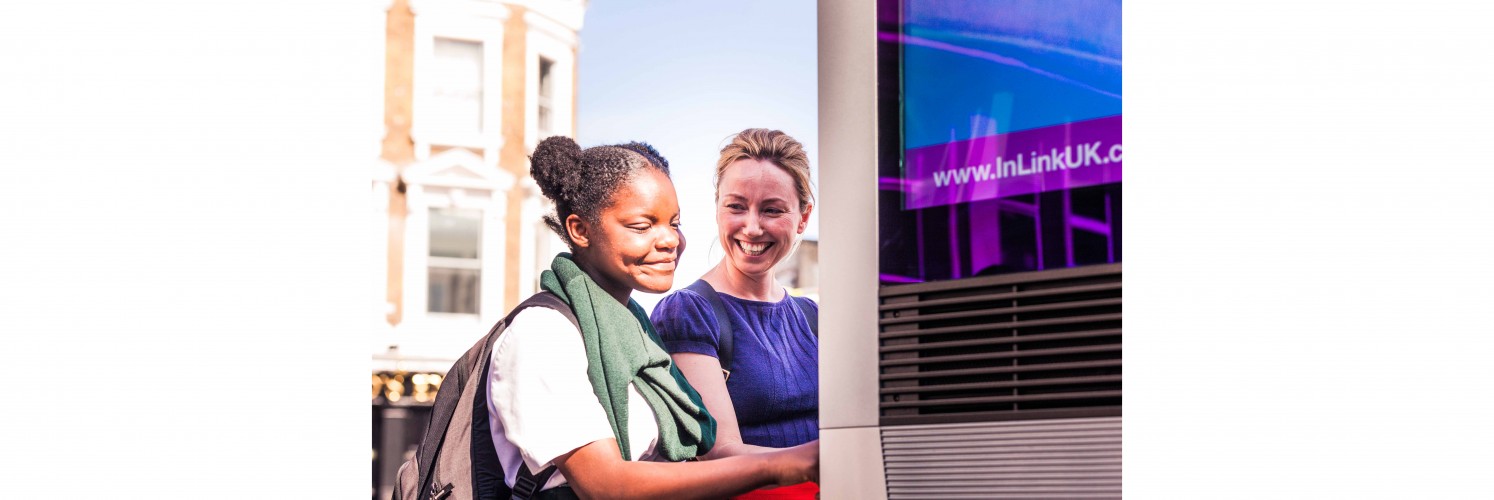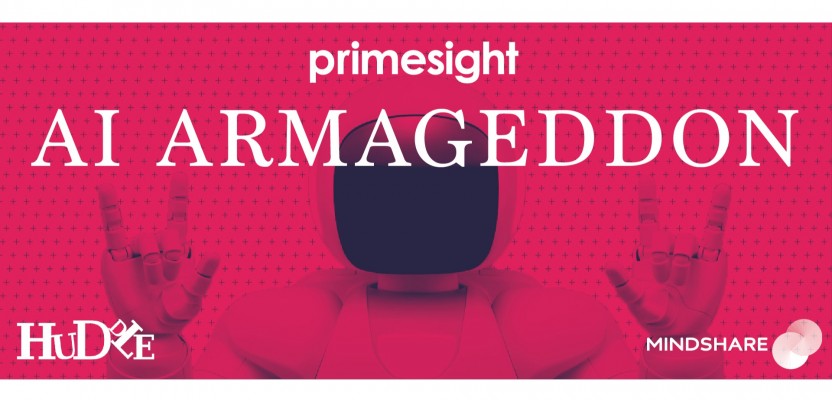However long you've been attending Mindshare's Huddle (and this is their seventh year) there's always something to learn and a new challenge to your existing views.
This year our Strategy Business Director, Joel Harris, hosted a panel on AI and the effect it will have on the media and advertising industry. Each of our speakers had a different view on where we're going and what the future has in store:
- Andy Tilley, CSO and Creative Partner at out-of-home specialist Talon Outdoor
- Hew Leith, CEO at data-driven innovation consultancy 10x
- Liam Rushforth, MD at creative tech company Flux Outdoor
So does AI represent the end of creativity and advertising or the beginning of a whole new methodology for brands? And is Armageddon really on its way or is this AI takeover as far off as the flying cars we've been promised for so long?
Rushforth kicked off the discussion with a description of the three stages of AI: weak/narrow, general and advanced, noting that we're still only in the weak/narrow stage where we can programme AI to do one thing very, very well (in the cases of Go and chess, to do it better than humans) and that there is still far to go. General AI can almost "think" at the same level of humans and complete multiple tasks just as well, if not better than humans. In the same way that humans look down on chimpanzees as being inferior, there may be a time during the advanced stage that AI and machine learning looks down on humans.
Given these three stages, for Leith who sits at the forefront of machine learning developments (having created an AI-brewed craft beer, and much more) does he regularly encounter any misconceptions? The most glaring error in his opinion is that people believe general AI (and beyond) is far closer than we're led to believe: at least 50-100 years the way Leith explained it.
So what's the link between AI and creativity? When developing ideas for this panel, looking behind us and looking ahead, it seemed very much as if creativity was dying out and the iconic, memorable ads of our youth were unlikely to be matched by any recent campaigns. In fact, of the most popular adverts of all time, how many of them came from the last decade? Is this what the future holds for advertising, in an increasingly fragmented market?
Tilley, having worked with some of the industry's greats (Trott and Hegarty to name just two) is well placed to talk about the evolution of creativity in advertising and the changes that multiple platforms have wrought when comparing the present landscape to the TV of old 'It was one channel available 12 hours a day. The stuff people used to buy they bought in bulk, in large numbers. In the 70s you’d be looking at 16,000 ratings when buying whereas it’s 1,600 ratings now, which is why those adverts were remembered.' There would be one creative up on a billboard for four weeks (rather than the two-week in-charge we have now) and 'because it was a different world then, people think that level of creativity is lacking now. Creatives struggle to meet the opportunities available out there because there is so much diversification.'
It's clear when talking about the evolution of creative output we're not comparing like with like.
Leith left the agency world feeling increasingly disillusioned with its set-up established 10x explaining that when it comes to effectiveness 'the whole thing is about engagement [...] we're fed up of brands using data to hammer people over the head with advertising.' Leith believes that the best model of marketing is allowing your consumers to do it for you; using Tesla as an example: people buy their Tesla, install a GoPro, stick the car in "Insane mode", upload a video to YouTube and watch it go viral. In that way, Tesla can spend $6 per car on advertising while GM pay $650.
On that note, while Amazon still only holds a 5% share of total retail sales, excluding food, it was widely predicted to swallow 44% of e-commerce sales in 2017* so 'is advertising even relevant if an algorithm is going to make the decision for you? How important will algorithms be in the future?'
For Tilley ‘the thing that’s missing is serendipity.’ If we're all left in our bubbles we lose out on watercooler moments that help to define our generation and the opportunity to discover something new. Advertising needs to work inside and outside of the bubble, and that's one way in which AI could prove useful: using machine learning to make different iterations of the original, creative idea behind a campaign. The example Tilley gave was using Coca-Cola's names campaign in outdoor advertising. Using electronic models you could piece together the most popular names in any given area and display those on a billboard 'the big idea should come from the creative and AI can help to filter it out from there' saving creatives from mind-numbing (and expensive for the client) moments of boredom as they produce poster after poster (Jack in Oxford. Olivia in Lichfield. Harry in Southampton. Jessica in Durham...).
Agreeing on this opportunity Rushforth added 'it always goes back to the data for us; a bunch of football fans get off the train at the same time - how can we adapt their environment to the mood they're in? Their needs in that moment?' but explained that even some big tech brands are aware of the shortcomings of machine learning, such as Netflix who stepped back from implementing the algorithm created by their $1m competition winner realising that while viewers would be offered shows they were almost guaranteed to love, they would no longer have access to serendipitous moments of discovery. For now at least. Looking to the future Flux's MD recognised that 'as it develops, strange mutations could help machines become more creative.'
Like the rest of the panel, Leith whole-heartedly supported the need for serendipity ('that's what makes us human. Optimisation just leads you to what you like') which is exactly what his team built into their algorithmically-brewed craft beer when they added wildcard ingredients to their menu. But what worries Leith is that 'people creating really powerful algorithms aren't offering that serendipity' and could not only be missing a trick, but also creating something with unpredictable consequences.
Tilley 'I'm not sure that everyone knows what they want. Data is history. You're basing it on things that have already gone. Comedy in the 1970s was situation comedy, half an hour, little jokes based on real life. That's what we knew. If you'd used algorithms it would have replicated that in different ways. Then along comes Monty Python, "now for something completely different" with a naked man at an organ. It would never have made it to air.'
Will we get to the stage where creativity is hijacked by AI? Rushforth 'it depends on the goal of an advert. Is it to sell stuff or be enjoyable? For a social media platform, a more effective advert is about getting plenty more clicks to make money. But I hope there'll be a balance where we get creativity and effectiveness.' Leith 'I agree. The world is going down the route of performance marketing.' And Tilley mentioned the 998 case histories studied by Binet and Field where it was all about '60% brand 40% activation [...] it shows that most of the decisions we make are from the heart, they're heuristic. We spend the time afterwards post-rationalising. If we lose the creativity and brand side of things, we'll be measuring stuff, but are we measuring the right stuff?' So will algorithms and AI have all the answers if they remain limited to performance marketing?
While the panel agreed that there are no right or wrong answers here, we still need to remind marketers of the value of fame, because the alternative is the AI Armageddon of our title. Leith 'Who's paying for the ads?' The system is based on conglomerates who are built on three things: product, distribution and brand 'what happens when the internet changes it all?' Products are suffering in a world of shared consumer reviews, supermarkets are threatened by online shopping and 'big brand advertising is on the way out. Essentially those companies won't exist anymore. They're all being disrupted by one thing: the internet'.
Suffice it to say, no-one on our panel wanted to be there if Leith's vision became a reality and Tilley's alternative was an advertising world where we truly realise the value of personalisation at scale (of the sort offered by OOH), finding moments where a large group of people are in the same mindset, such as Virgin Trains using digital billboards to talk to people stuck in traffic jams. It's possible to have mass media and personalisation if you're willing to put the effort in 'mass media needs to adapt and luckily with digital the advent has come in outdoor.'



